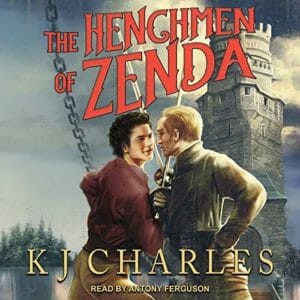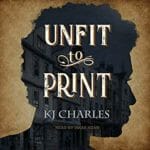A retelling of Anthony Hope’s 1894 classic adventure story The Prisoner of Zenda from a different point of view, K.J. Charles’ The Henchmen of Zenda introduces us to Jasper Detchard, a disgraced and debauched former army officer who unrepentantly fights and fucks his way around Europe, making his living as soldier of fortune. He’s approached by Michael Elphberg, Duke of Strelsau (from the small European kingdom of Ruritania) to join his trusted bodyguard – known as “the six” – and take part in the overthrow of Michael’s half-brother, the country’s new king, Rudolf V.
The original novel is narrated by one Rudolf Rassendyll, an English gentleman who bears an uncanny resemblance to King Rudolf, and who is holidaying in Ruritania when he is approached by the king’s closest advisers and asked to impersonate the monarch during his upcoming coronation because he’s falling down drunk and unlikely to be sober in time to attend. When Michael’s men kidnap the king, things get even more complicated; Rassendyll falls in love with the king’s betrothed, the Princess Flavia, and all ends well after Rassendyll rescues the king and then honourably bows out, leaving Flavia to do her duty to king and country. It’s a “Boy’s Own” swashbuckling adventure, a piece of Victorian pulp fiction complete with all the clichés and conventions demanded by the genre; an altruistic, honourable hero, a damsel in distress and a black-hearted villain… or two. K.J. Charles does a superb job of turning these conventions on their heads, inside out and backwards to create a story that immediately takes on a life of its own separate from the source material, and of turning the characters into fully-rounded individuals rather than the rather two-dimensional cyphers they are in Hope’s tale.
When I read The Henchmen of Zenda earlier this year, Detchard’s immediate dismissal of Rassendyll’s account as a pile of shit signalled I was in for a good time ;) His sarcastic, world-weary narrative style captured my attention immediately and sets the overall tone for the story, which is laden with devil-may-care irony and biting wit. The original storyline has been enhanced by the addition of an intriguing sub-plot that adds depth and nuance to the characters and provides a much greater degree of insight into their motivations.
But I’m not going to delve into the storyline any further, because it’s complex and twisty and I don’t want to spoil it. I’ll just say that it quickly emerges that Detchard’s reasons for accepting Michael’s offer are not what they at first seem – and that he’s signed up to play a dangerous game. Which is why he doesn’t really need the distraction offered by the sudden arrival of the gorgeous reprobate and all-round force of nature that is Rupert of Hentzau.
Hentzau is one of those villains who gets all the best lines; unutterably handsome, charming, dissolute and devious, he was one of the king’s carousing companions before he switched sides; and Detchard is – against his better judgment – captivated by his beauty and brazen cheek, recognising in him a kindred spirit, a man without honour or morals. The sparks fly immediately, their chemistry is electric and it’s impossible not to root for them – liars, cheats and murderers though they are – because they’re so damn engaging. Their relationship is refreshingly down to earth; neither is interested in or comfortable with the concept of romance, but it’s nonetheless clear by the end of the story that something has developed between them that is based on more than physical attraction; their gradual transition from wariness and distrust to mutual respect is skilfully done, and while there’s not an HEA in the traditional sense, what we get is probably as close to happy ever after as these two are ever likely to want and feels absolutely right for them.
Keen-eyed readers may have noticed that I’ve referred to my experience of reading the book so far in this review, which is because, I’m afraid, the audio version turned out to be something of a disappointment. Antony Ferguson is an experienced narrator; his speaking voice is attractive and possesses an element of gravitas to it that works well when portraying upper-class, authoritative heroes, and his delivery is crisp and well-paced. But that element of gravitas I mentioned works against this particular story as it pretty much strips out all the wry humour and jaunty sarcasm that’s so much a part of the story. Ms. Charles is an extremely gifted writer and her books are full of a uniquely English style of wit and humour – but the vivacity and mischief that just leapt off the page are largely absent in audio.
Most of the characters in the story are men, and I found myself relying on dialogue tags quite often to work out who was speaking. Mr. Ferguson’s character differentiation is fairly minimal; the only time there is enough of a difference between the portrayals of Detchard and Rupert to enable the listener to distinguish them easily is in some of the longer scenes between them later in the book, when he pitches Rupert’s voice slightly higher than Detchard’s. Otherwise, they’re very similar, and the same is true of Michael, whose voice is in the same register and is often only differentiated by means of a slight drawl. Two of the other henchmen – a Belgian and a German – are differentiated by accent; Bersonin (the Belgian) has a slight French accent, which is fine; but I didn’t recognise the accent given to von Lauengram as coming from anywhere near Germany – and he had this horrible, phlegmy croak that made me think someone should have handed Mr. Ferguson a box of tissues stat.
A couple of important names are frequently mispronounced and should surely have been corrected prior to release. Mr. Ferguson refers, at various times, to Rupert of HentzOW, HentzOR and HentzORER, and to Strelsau, the capital of Ruritania as both StelsOR and StrelsOW. It should be HentzOW and StrelsOW. (“OW” is the closest I can get to writing down the pronunciation of the German dipthong “au”.) On a more positive note, Mr. Ferguson’s female voices are good; he portrays both Antoinette de Mauban and Princess Flavia sympathetically and by means of a softening in tone and timbre and slightly higher pitch, which works well for both.
I’m a huge fan of the author’s and will continue to be so; and in print, The Henchmen of Zenda might well make my Best of 2018 list. In audio… no, and that’s a shame because I’ve loved and highly recommended pretty much all of the other audiobooks that are available of this author’s work. So if you have yet to experience this rip-roaring adventure yarn, my advice would be to stick to the print version if you can.
Note: I’ve given the same content rating as I gave the print version; had I listened to the audio before reading the book, I suspect I’d have given the story a much lower grade because I wasn’t fully engaged by the narration.
Caz
Buy The Henchmen of Zenda by K.J. Charles on Amazon





1 thought on “The Henchmen of Zenda by K.J. Charles”
Comments are closed.